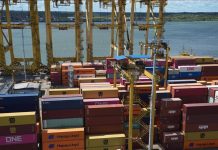PRIME Minister Kassim Majaliwa has directed Zanzibar’s Ministry of Trade and Industry to ban sugar imports until the consignment produced at Mahonda sugar factory is absorbed in the market.
It is the only factory operating in Zanzibar but its product has been lying in its warehouses as the Isles’ market is always flooded with sugar imported from abroad, a situation that raised concern not only on the part of the factory management but the Prime Minister himself.
The PM issued the directives yesterday when he toured the plant at Mahonda area in Kaskazini ‘A’ district, Unguja North region.
Mr Majaliwa said that it did not make sense that the only factory in Zanzibar that produces 6,000 tonnes of sugar per year lacks a market while the annual demand of the product in the Isles was 36,000 tonnes.
He said that the Ministry of Trade was responsible for ensuring that sugar produced at the factory was given priority in the market because its quality was assured.
“You (Ministry) must change … you should come up with a proper system of managing sugar importation in Zanzibar to protect local factories … we cannot please a few people at the expense of others,” he said.
He said the government was committed to promote economic growth through the industrial sector; therefore local industries should be protected because they provide employment to the people, reliable market to farmers and revenue to the government.
The Premier said failure by the Ministry of Trade to properly coordinate sugar importation will hold back investment efforts, as it implies sabotage because it will cause unemployment and deny the government its revenue.
He said the national policy insists on the importance of protecting local producers whose products have been approved by respective authorities.
“Local investors must be protected by making sure that they get a market for their products and encourage people to use them.”
Earlier the company Director Mr Rahim Bhaloo, said the factory produces 6,000 tonnes per year while it has the capacity of producing more than 20,000 tonnes but they were facing a challenge of a market and land for cultivating sugarcane.
He said due to lack of market of 5,000 tonnes of sugar produced during the 2019/2020 season, only 2800 tonnes had been sold.
He requested the government to support them in finding a market and land to enable them increase production.
Meanwhile, Prime Minister Majaliwa yesterday expressed dismay over the filthy streets in Zanzibar city, directing Urban West regional authorities to keep the tourist metropolis tidy.
“This is a tourist town and it should always remain clean. Unfortunately, the city roads are dirty with lot of potholes,” charged Premier Majaliwa during his briefing to Urban West regional leaders prior to the start of his tour of the region.
He challenged all the councils in the region to intensify revenue collections and invest wisely in improving the city’s road infrastructure and provision of social services like education and health.
“We have experience of huge thefts and misappropriation of public money at the local government levels, most of the collected revenues are squandered…the government will no longer tolerate that,” warned the premier, insisting on collecting revenues electronically.
He reminded local government executives to set realistic revenue collection targets, arguing that many of them were making “lazy projections,” which are easily achieved.
He expressed displeasure over almost all district councils meeting their revenue targets by 100 per cent.
“I think you are making your (revenue collection) targets lazily, there is no pride to meet the targets by 100 per cent and yet you don’t have enough money to finance your operations. Work out realistic projections, which will compel you to work hard,” ordered the premier, tasking the councillors and mayors to strictly supervise and approve the projections.
He decried dismal performance in education, referring to the regional report, which indicated that for the past two years, the pass rate for primary education finalists has ranged between two and four per cent.
“This is shameful, there are serious education sector problems here, we must change,” Mr Majaliwa said, warning that the Indian Ocean’s semi-autonomous archipelago was creating a highly destructive time bomb through dumping into the streets over 90 per cent of primary school leavers as failures.
At Kizimbani-based State University of Zanzibar’s (SUZA) School of Agriculture, Mr Majaliwa pledged support to acquire tractors for practical training and more land.
He challenged students to study hard and create their own jobs instead of relying on the government.
“It’s high time we got rid of excessive reliance on government employment, the best approach is for everyone of us here to study hard and get the appropriate skills to create jobs and employ others,” counselled Premier Majaliwa.
The prime minister started his second-day tour of Zanzibar with a regional briefing at Mtoni.
Urban West Regional Administrative Secretary (RAS) Saleh Mohammed Juma presented the regional development report, saying the region had registered great feats in almost all economic sectors—tourism, agriculture, fishing and industry—in the past four years.
He said the region was peaceful, appreciating the defence and security agencies in the region for the good job that had maintained harmony in the tourist hub.
Mr Majaliwa is on a three-day working tour, which he started in Unguja South on Friday amid strong warning against public employees bent on discriminating citizens on the basis of their tribes, religions or races.
He said Zanzibaris were eager to have their social and economic problems adequately addressed, stressing on government employees to get down to the people to implement the pledges that the ruling Chama Cha Mapinduzi (CCM) made during the 2015 general elections.







